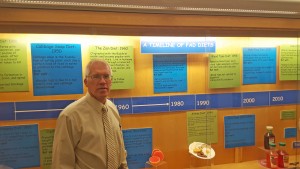
Put three random U.S. adults in the same room. It’s likely that one of them is obese, according to The Journal of the American Medical Association. Pew Research found that 24 percent of U.S. adults have looked up weight loss or weight control on the Internet.
But advocates of the Health at Every Size (HAES) ideology say weight loss shouldn’t be people’s main concern.
Professionals are presenting Health at Every Size movement ideas because they say focusing too much on weight loss could do more harm than good.
Co-directors of Beauty Redefined, Lexie and Lauren Kite, lectured at BYU on Feb. 25, 2016, as part of the proceedings for National Eating Disorders awareness week.
Lexie Kite said some people disagree with the movement.
“It’s really easy to just be shocked at the fact that people could like themselves at any size and they could claim to be healthy at any size and weight,” Kite said. “And the truth is that they really can be.”
Five principles make up the base of the HAES movement: weight inclusivity, health enhancement, respectful care, eating for well-being and life-enhancing movement.
The Association for Size Diversity and Health (ASDAH) trademarked the term Health at Every Size, according to Dawn Clifford associate professor and director of the didactic program in dietetics at California State University, Chico.
Clifford is also on the the ASDAH leadership team. She said research has shown the biggest benefits of following HAES ideology go beyond physical health and come in the form of emotional well-being.
“People who receive Health at Every Size programming tend to have better body esteem, less body dissatisfaction, fewer disordered eating patterns and even, some researchers have found, reduced depression,” Clifford said.
Nutrition professor Merrill Christensen has taught at BYU for 34 years. He knows some diets technically work, but might not be the healthiest option.
“You can’t say diets don’t work. Of course they work, if all you’re concerned about is getting weight off,” Christensen said. “You can lose weight on any diet. Now, if you’re trying to improve health or if you’re trying to not just to lose weight but keep it off, well then there are other things you have to do.”
Clifford described a few steps to take for people who are looking to focus on something other than the scale:
- Tune into body cues to guide when and how much to eat.
- People should weigh themselves less often and eventually not at all.
- Engage in physical activity they enjoy.
Clifford said reading a book such as “Intuitive Eating” could help a person understand the concepts she explained.
“I think the first step is tuning into your body’s cues to guide when to eat and how much to eat, so starting to pay attention to hunger and fullness,” Clifford said.




